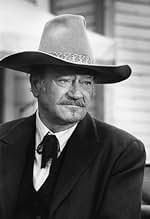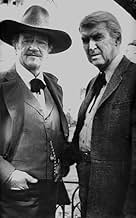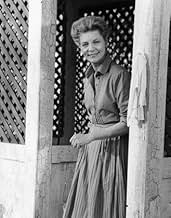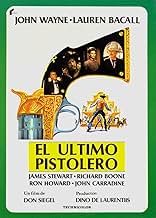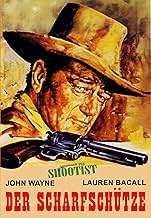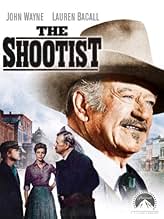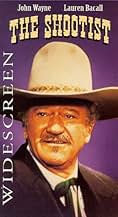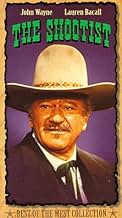A dying gunfighter spends his last days looking for a way to die with a minimum of pain and a maximum of dignity.A dying gunfighter spends his last days looking for a way to die with a minimum of pain and a maximum of dignity.A dying gunfighter spends his last days looking for a way to die with a minimum of pain and a maximum of dignity.
- Director
- Writers
- Stars
- Nominated for 1 Oscar
- 1 win & 5 nominations total
- Girl on Streetcar
- (as Melody Thomas)
- Man Outside Metropole
- (uncredited)
- Director
- Writers
- All cast & crew
- Production, box office & more at IMDbPro
Featured reviews
Also in the cast is Lauren Bacall as the recently widowed inn keeper. She helps keep Wayne's character fulfilled and feisty during his last days. Ironicly, this job was something she was familiar with, as she did this in real life with her late husband Humphrey Bogart.
There are many good performances by the rest of the cast. But it is the circumstances under which they were filmed for Wayne, that make his a truly unbelievable performance. There are two of his scenes that stand out for me: 1) Listening to John Wayne and Scatman Crothers haggle over the selling price of Wayne's horse. Yeah, it might not sound like much here in print, but that's just a testimony of how well these two actors pull that scene off. Just great. 2) Seeing John Wayne enter the saloon with a purpose for the last time. Truly one of the most bone chilling cinematic moments of all time.
If you love John Wayne then I'm certain that you love this film already. If you can take or leave John Wayne, you might at least like this film. But if you don't care for Wayne or for that matter, if you don't like westerns, you'll probably still like this film. At least I hope so. 9/10.
Clark Richards
At the period in which this film is set, gunslingers or `shootists' were soon to go the way of the horse and buggy. The queen (Victoria) had just died. Electricity, modern plumbing, modern commerce, modern transportation, and creature comforts were beginning to take over (check out the electric ceiling fans and mosaic tiles in the saloon!). Forward to real life'. It is 1976. One by one, the mythic legends created by dime novels and Hollywood movies are being demystified. From Billy The Kid to Buffalo Bill, to Bonnie and Clyde, audiences have been shown for over decade how legends have always been manufactured. There are some who may see this demystification as a negative thing, but when people start adoring soldiers, celebrities and gangsters as something more than human, it's time to set the record straight. That's what all the best films of the seventies did. They broke the myths but they did not break the spirit, for what they did was let US, not the supermen on the screen, become the heroes. We could be afraid, old, young, ill, or weak, and we could feel pain and humiliation. In the process of confronting our limitations we become stronger. To be a stronger human being is to become civilized. Like this film shows us, we CAN reject the gun and join civilization. This film is John Wayne's gift to us. He is enabling us to grow up, to look at the past with respect, but to face the future with responsibility. His John Books is worth more to us than all his superheroes put together. We're all gonna die, we're all afraid, and pain is very, very real. It is in the process of surrendering to this fact with dignity and humility that we in a sense become immortal. To try to live as a superman is to die a fool. Only cowards (and very dangerous people) embrace myths over reality. That dainty red pillow has made The Duke sit very tall in his saddle indeed!
Wayne portrays J. B. Books, the most famous lawman in the West who killed thirty men in his life... Books arrives to Carson City in 1901, the day Queen Victoria died in England...
Wayne went first to get a medical diagnosis known to everyone as cancer.
Dr. Hostetler (James Stewart) was too practical... He gives Book the most potent pain-killer he gets, and tells him where to stay in town...
The film is build to one and only purpose: To let Wayne die with dignity, without physical pain, at the Metropole gambling saloon, in a showdown with three heavies: Richard Boone, a bad-tempered ugly man who wants to avenge his brother's death; Hugh O'Brien, a skilled dealer and a presumptuous gunfighter; and Bill McKinney, an unpleasant provoking gunman just released from prison...
Ron Howard plays the crude graceless adolescent, the first to meet Wayne in the street: 'The old man ain't worth a bullet,' he says, 'he looks all tuckered out.' In this particular scene, it comes to my mind the insolent young punk, Skip Homeir, who tries to prove something when he confronts Gregory Peck in the psychological Western "The Gunfighter."
Wayne seems surprised by the visit of Serepta (Sheree North), an unscrupulous aging lady-love who tries to take advantage of him, asking him to marry her simply for a marriage certificate, and a famous name... She surely was not the woman of quality, the good prostitute (Claire Trevor) in "Stagecoach."
John Carradine, who plays the mysterious passenger, also in "Stagecoach," makes a brief appearance as the undertaker...
Tying to overcome his bloody past, John Wayne shows, in the film, the other side of the 'Shootist,' his human side... We find him pleasantly amusing when he reveals to Stewart the truth about the red fancy cushion he carries in the film...
Filmed in Carson City, Nevada, and with a fine supporting cast, this untraditional motion picture is a lyrical elegiac Western of the highest quality, a moving tribute to a legendary actor and a tender farewell to a Super Star...
One of Wayne's best in which from the opening edition of clips from Wayne's earliest movies as ¨Rio Rojo , Rio Bravo¨ , to the ending impressive shootout in the cavernous saloon , Siegel film is moving , quiet and subtle . The picture pays tribute to John Wayne with none of the indulgences , humor and irony that permeated ¨True Grit and Rogster Cogburn ¨ . John Wayne heads the top-drawer main and support cast , he gives a very good as well as dignified acting as a dying gunfighter who spends his last days looking for a way to die rightly but prevented from doing so various younger gunmen out for vendetta or to prove their worth against him . However , Paul Newman, Charles Bronson, Gene Hackman and Clint Eastwood turned down the lead role before John Wayne was cast. Infused with an appropriately wintry feel ,the admitted sentimentality and sadness is maintained througly and in keeping with the elegiatic style . This one results to be a valedictory tribute to both , the Western in general and the great Wayne , the Duke , in particular . The interpretations are uniformly top-notch , standing out an awesome plethora of secondaries as James Stewart , Lauren Bacall , Ron Howard ,John Carradine , Sheree North , Bill McKinney , Harry Morgan , among others . It contains an enjoyable and thrilling musical score by Elmer Bernstein in his usual style . Atmospheric and evocative cinematography by Bruce Surtees.
The motion picture was well directed by Donad Siegel who handles both tone and pace wonderfully . Donald made his reputation in the early and mid-'50s with a series of tightly made , expertly crafted , tough but intelligent "B" pictures , among them : The Lineup (1958), Riot in Cell Block 11 (1954) , then graduated to major "A" films in the 1960s and early 1970s . Director Siegel brought an entirely new approach to the Sci-Fi field Invasion of the Body Snatchers (1956) . He made several "side trips" to television, mostly as a producer . Siegel directed what is generally considered to be Elvis Presley's best picture , Flamingo Star (1960). All of Eastwood's later Western and his ¨Dirty Harry¨ movies owe a considerable debt to Sergio Leone and Donald Siegel . As Donald directed Eastwood in various films , such as : ¨Coogan's bluff , The beguiled , Dirty Harry , Escape from Alcatraz and Two mules and sister Sara¨. He had a long professional relationship and personal friendship with Clint Eastwood , who has often said that everything he knows about filmmaking he learned from Don Siegel .
Did you know
- TriviaJames Stewart agreed to play a cameo role in the film only because John Wayne had specifically requested him. His brief screen time proved to be rather difficult. The bad acoustics of the huge, hollow sound stages worsened his hearing difficulties, and he stayed by himself most of the time. He and Wayne muffed their lines so often in the main scene between them that director Don Siegel accused them of not trying hard enough. Wayne's reply was a variation on an old John Ford line, advising the director, "If you'd like the scene done better, you'd better get a couple of better actors." Later on, the star told friends that Stewart had known his lines, but hadn't been able to hear his cues, and that in turn had caused his own fumbling.
- GoofsBooks' hair (John Wayne's toupee) goes from being parted on his left to his right then back to his left after he tells Marshal Thibido he's a dying man when they first talk in Books' room.
- Quotes
Gillom Rogers: [first lines, voiceover] His name was J.B. Books, and he had a matching pair of 45's with antique ivory grips that were something to behold. He wasn't an outlaw. The fact is for a while he was a lawman. Long before I met Mr. Books, he was a famous man. I guess his fame was why somebody or other was always after him. The wild country had taught him to survive. He lived his life and herded by himself. He had a credo that went:
John Bernard Books: I won't be wronged, I won't be insulted, and I won't be laid a hand on. I don't do these things to other people, and I require the same from them.
- ConnectionsFeatured in Sneak Previews: The Top Ten Films of 1976 (1977)
- SoundtracksWillow, Tit Willow
Music by Arthur Sullivan
Lyrics by W.S. Gilbert
Performed by John Wayne & Lauren Bacall
- How long is The Shootist?Powered by Alexa
- What automobile is featured in the film?
Details
Box office
- Gross US & Canada
- $8,091,910
- Gross worldwide
- $8,091,910
- Runtime1 hour 40 minutes
- Color
- Sound mix
- Aspect ratio
- 1.85 : 1
Contribute to this page



